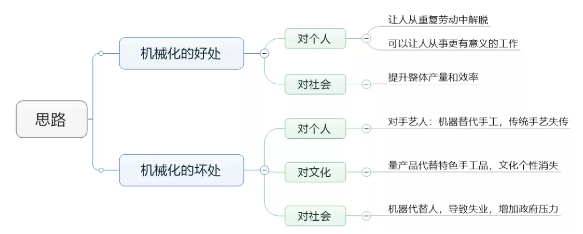In today’s society, more and more work is done by machines. Do you think the positive effects of the development outweigh the negative effects on individuals and society?
题目来源:2015年11月9日大陆雅思大作文
题目大意
现在越来越多工作由机器完成。这种趋势对个人和社会的利弊如何?
审题,找出关键词
Machines:题目的话题是机械化的利弊,利弊所参照的对比内容可以是传统的手工业:坏处可以联系到两方面:机器导致人的失业;流水线产品代替手工产品,导致传统文化的消亡。好处可以来自己机械化本身(高效,高产,让人类从繁重重复劳动中解放出来)
individuals and society: 对利弊的对象有要求,必须要涉及个人和社会(社会是抽象词,可以细化为商业,文化等领域)
写作思路解析
➡️ 题目问的是利弊,可以用三种回答:1)利>弊, 2)弊>利 3)利弊相等
➡️ 在利弊的PK时,要注意2点:1)对单个利弊的论证的合理性;2)两者比较的侧重,即在严重性方面能体现出一方>另一方;
➡️ 分析利弊时,尽量从多个角度阐述,多问问自己这个好处是否站得住脚,或这个坏处是否是不可解决的;让论证更严密;
➡️ 题目的话题是机械化的利弊,利弊所参照的对比内容可以是传统的手工业:坏处可以联系到两方面:机器导致人的失业;流水线产品代替手工产品,导致传统文化的消亡。好处可以来自己机械化本身(高效,高产,让人类从繁重重复劳动中解放出来)
提纲梳理见下
写作示范
It is true that the modern world is moving in a direction where more routines are doing by machines. While this trend is applauded by many people, I would say that we should not be too optimistic when considering its detrimental effects on individuals and society.
Superficially, the trend of automation does seem to benefit the world in various aspects. At an individual level, the trend liberates many people from mundane tasks, allowing them to do something more meaningful: farmers can spend more time and effort to focus on market price and the sales when mechanized farming releases them form the routine tasks like sowing and turning up soil. Also, In the eyes of entrepreneurs, what concerns them most is the increased productivity and efficiency thanks to the wide application of machines.
However, in my opinion, these benefits mentioned above should be considered from an opposite angle. Firstly, rather than liberating people from mundane work, the era of mechanization has also witnessed the extinction of many handicrafts and traditional skills. Taking this problem one step further, with hand-made artefacts being ousted by the faceless uniformed products from assembly lines, what frustrates us more is the lack of national identity and diversity and richness in cultures worldwide, given the fact that a nation’s cultures, customs and ethos are inextricably bound up with its traditional artefacts. Another problem we cannot afford to ignore is the unemployment problem ensued: while manufacturing sectors enjoy the dividend using robots replacing human labors, what will ensue is the unemployment of millions of workers, a problem that is hard to swallow for any governments.
In conclusion, I would say that the industrialization should not be at the sacrifice of the traditional skills and unemployment.


